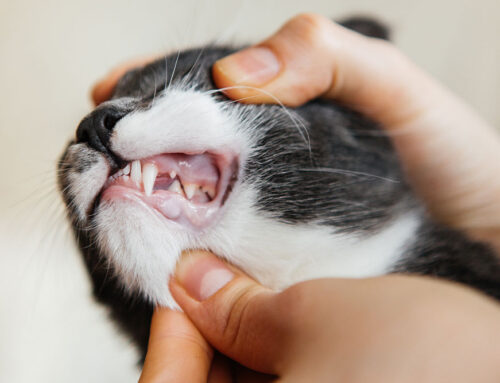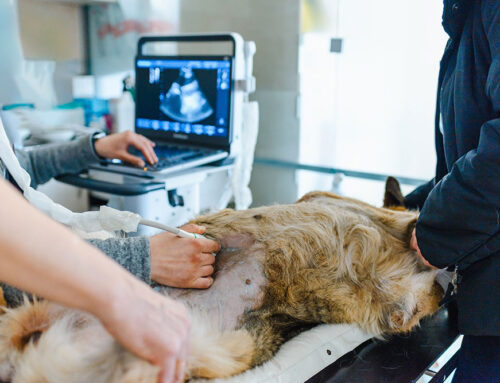Pain in pets often goes unnoticed—not because it’s rare, but because animals instinctively hide their discomfort. What once helped them survive in the wild can now make it harder for even the most attentive owners to know when something’s wrong. At Cobb & Co. Veterinary Clinic, we believe no pet should suffer in silence. Understanding the signs of pain and when to seek help is essential to keeping your furry family member happy, healthy, and comfortable.
In this guide, we’ll walk you through how to recognize pain in dogs and cats, common causes, treatment options, and how we support pets living with chronic pain.
How Do Pets Experience Pain?
Just like people, pets can suffer from both acute (sudden and short-term) and chronic (ongoing) pain. The difference is—they can’t tell us.
Dogs may limp or vocalize. Cats may hide or avoid interaction. What may seem like “slowing down” or “being a bit off” could actually be a sign of deeper discomfort.
Learn more about the root causes in The Why and the “Ow”: 7 Conditions That Cause Pain in Pets.
Subtle But Serious: Signs Your Pet May Be in Pain
You know your pet best. Pay attention to small changes that might signal something more serious.
Behavioral Changes
- Avoiding affection or suddenly becoming clingy
- Pacing, restlessness, or reluctance to move
- Decreased appetite or altered eating habits
- Hiding or changes in sleeping patterns
Physical Signs
- Limping, stiffness, or difficulty getting up
- Excessive licking or biting at a certain area
- Postural changes (arched back, hunched stance)
- Reduced grooming in cats
Vocal and Facial Cues
- Whining, growling, or yelping
- Tense facial muscles or squinting
- Flattened ears or a furrowed brow
For more visual and behavioral cues, visit What’s Wrong? Common Pet Pain Signs.
Common Causes of Pain in Pets
Pain can come from many different sources. Some of the most frequent include:
- Arthritis and joint degeneration
- Dental disease, including infections, abscesses, and fractured teeth
Explore our Dental Services
- Injuries, such as fractures, ligament tears, or paw pad wounds
- Post-surgical pain—especially if not well-managed at home
Learn about our Surgical Care
- Internal conditions like pancreatitis, kidney disease, or cancer
- Neurological pain, including disc disease and nerve compression
Why Is My Dog Limping?
Limping is one of the most obvious—but also most misunderstood—signs of pain. It may appear suddenly or worsen over time. Some causes include:
- Joint problems like hip dysplasia or arthritis
- Knee injuries, including cruciate ligament tears and luxating patellas
- Foot or nail injuries, infections, or foreign bodies
- Neurological issues, affecting balance and movement
Read more from the AKC: Why Is My Dog Limping?

When to Call the Vet
Not all pain is an emergency—but some situations require immediate care:
- Sudden inability to walk or stand
- Continuous crying or panting in distress
- Persistent limping (24+ hours)
- Swelling, heat, or open wounds
- Loss of appetite or major behavior shifts
If you’re ever unsure, don’t wait—contact us for a same-day evaluation.
How We Manage Pain at Cobb & Co. Veterinary Clinic
We take a multimodal approach—combining medication, nutrition, and alternative therapies for the most effective, least invasive results.
Medications
- NSAIDs and opioids tailored specifically for pets
- Gabapentin and amantadine for chronic or nerve-related pain
- Avoid over-the-counter human medications—these can be toxic
Get the Facts: Pain Relievers and Pets – FDA
Alternative Therapies
- Cold laser therapy to reduce inflammation and speed healing
Laser Therapy – AAHA
- Acupuncture to stimulate healing and manage chronic discomfort
What Is Acupuncture? – AAVA
- Rehab and physical therapy for mobility and strength
Veterinary Physical Rehabilitation – AAHA
Supporting Pets Living with Chronic Pain
Pain that doesn’t go away still deserves treatment—and so does your peace of mind.
Home Adjustments
- Use ramps, orthopedic beds, and non-slip rugs
- Elevate food and water bowls for pets with joint pain
- Provide gentle, low-impact exercise daily
Behavioral & Environmental Support
End-of-Life Planning
We also offer compassionate, supportive end-of-life care and quality-of-life evaluations to guide difficult decisions with empathy. Learn More About Our End of Life Services.
Let Us Help Your Pet Feel Better
At Cobb & Co. Veterinary Clinic in Elgin, Illinois, we offer advanced diagnostics, compassionate care, and personalized pain management for every pet. Whether your dog is limping, your cat seems withdrawn, or you’re not sure if something’s wrong—we’re here to help you find answers and comfort.
You don’t have to guess whether your pet is in pain. Let’s find out together.






Leave A Comment